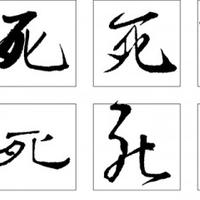#7: “死 ”的 用法
#7: Usage of "dead"
#7: Uso de "muerto
#7位:"dead "の用法
#7: Использование слова "мертвый"
在 中文 里面 ,“ 死 ” 除了 表示 死亡 、 去世 的 意思 之外 , 还有 一个 重要 的 用法 。
In Chinese, “death” has an important usage in addition to the meaning of death and death.
这种 用法 在 口语 中 使用 , 能 很 夸张 地 描述 一件 事情 或者 表达 人 的 心情 。
This usage is used in spoken language and can be an exaggerated description of a thing or a person's mood.
Kata ini digunakan dalam bahasa lisan untuk menggambarkan suatu peristiwa atau mengekspresikan suasana hati seseorang dengan cara yang sangat berlebihan.
这种 用法 很 简单 , 就是 “ 动词 / 形容词 + 死 了 ”。
This usage is very simple, that is, "verb / adjective + dead."
如果 天气 很 热 , 人们 抱怨 “ 热死 了 ”。
If the weather is hot, people complain that “hot is dead”.
公共汽车 上人 太 多 , 人们 抱怨 “ 挤死 了 ”。
遇到 不 高兴 的 事情 , 人们 就 抱怨 “ 气死 了 ”。
When people encounter unhappy things, people complain that they are "mad."
突然 被 惊吓 , 人们 就 抱怨 “ 吓死 了 ”。
Suddenly frightened, people complained that they were "scared to death."
工作 太 多 , 工人 抱怨 “ 累死 了 ”。
There is too much work, and the workers complain that they are "tired."
没有 事情 做 , 人们 抱怨 “ 无聊 死 了 ”。
如果 肚子 很 饿 , 可以 说 “ 饿死 了 ”; 但是 别 吃 太 多 , 否则 就要 “ 撑死 了 ”。
If your stomach is very hungry, you can say "starve to death"; but don't eat too much, otherwise you will "support death."
另外 , 还有 “ 担心 死 了 ”,“ 着 急死了 ” 等等 。
In addition, there are also "worried about death", "anxiously dead" and so on.
如果 你 的 中文 很 好 , 你 甚至 可以 说 慢速 中文 “ 慢死 了 ”。
If your Chinese is very good, you can even say that slow Chinese "slowly dead".
Jika bahasa Mandarin Anda sangat bagus, Anda bahkan dapat mengatakan bahwa bahasa Mandarin yang lambat adalah "lambat sampai mati".
更 有意思 的 是 ,“ 死 ” 也 可以 用来 表达 好 心情 。
More interestingly, "death" can also be used to express a good mood.
收到 礼物 , 寿星 觉得 “ 开心 死 了 ”。
After receiving the gift, Shouxing felt "happy and dead".
考试 取得 好 成绩 , 学生 觉得 “ 高兴 死 了 ”。
The test scored good and the students felt "happy to die."
见到 明星 , 歌迷 们 觉得 “ 激动 死 了 ”。
When I saw the stars, the fans felt that "excited to die."
另外 , 还有 “ 兴奋 死 了 ”,“ 幸福 死 了 ” 等等 。
In addition, there are “excited death”, “happiness is dead” and so on.
记住 , 在 这种 好 的 情况 下 , 一般 不用 这种 用法 来 描述 一件 事情 。
Remember, in this good case, this usage is generally not used to describe one thing.

